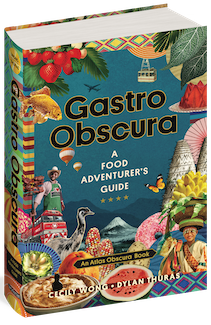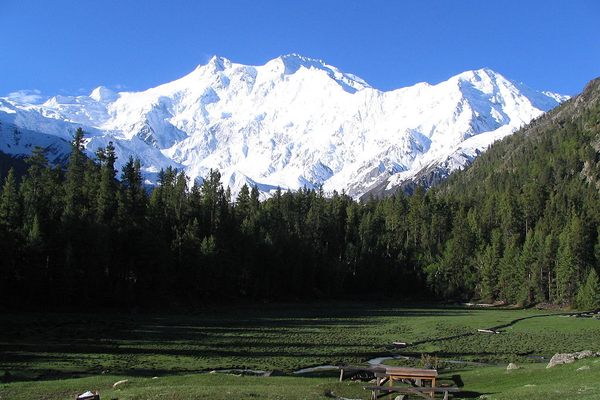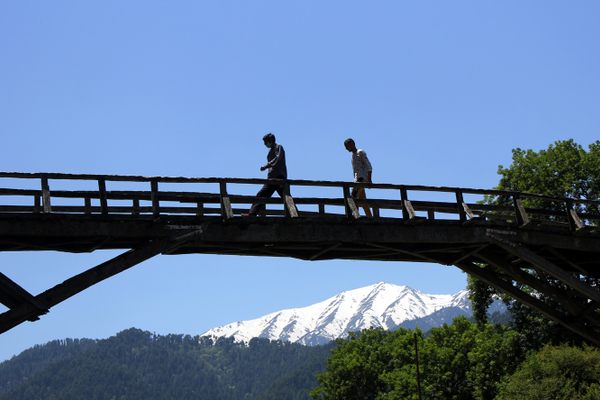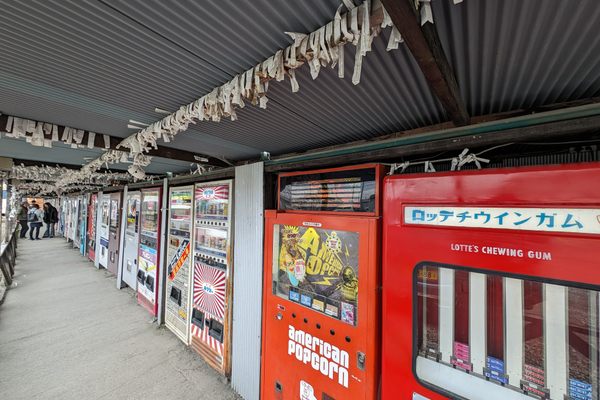Arq-e-Gulab
An old curiosity shop holds on to a centuries-old tradition of manually-distilled rose water.
Along the dusty bylanes of Srinagar’s Old City, the faint scent of roses lingers weakly, tamed by the onslaught of time and unending political tumult that has ravaged the area. Here, in the Fatehkadal neighborhood, steps from the Khanqah-e-Moula shrine—a tribute to Mir Sayyid Ali Hamadani, the preacher credited with introducing Islam to Kashmir—is a carved walnut door in a crumbling brick building. This is Arq-e-Gulab (“rose water” in Urdu), an unlit curiosity shop frozen in time, considered to be the last remaining rose water distillery in Kashmir’s capital, and certainly one of the oldest-surviving of such traditional operations.
A wooden window opens its shutters to form a makeshift storefront, with dark glass decanters lined along the sill. The proprietor, Aziz Kozgar, is the last of a long line of apothecaries who, legend goes, arrived in the Kashmir Valley from Turkey around 500 years ago. In South Asia, rose water is traditionally sprinkled on devotees to mosques, and on guests entering the threshold of ceremonies considered blessed, such as weddings. It is also used in cooking, and is a refreshing addition to drinks in the summer. Chilled rose water sprinkled on handkerchiefs and dabbed on the face is a popular way to keep the body cool on the hottest summer days.
Kozgar hunches over emerald glass bottles and filigreed decanters that were purchased from Europe in the shop’s heyday, decades ago. Empty bottles line the shelves, stained and largely unused. There is something Dickensian about the atrophying beauty of Arq-e-Gulab: A silver-haired patriarch presiding over an empire of evaporated fragrances. The Kozgars were experts in Unani medicine (an ancient Perso-Arabic system of medicine with roots in the teachings of Galen and Hippocrates), and Aziz Kozgar remembers stacked mountains of rose petals in the family’s courtyard, ready to be crushed for syrups and manually distilled into rose water. The family would also make a variety of herbal concoctions, but the shop now specializes mainly in rose water and a couple of other traditional herbal syrups thought to aid in digestion, which are still prepared as they were centuries ago.
Arq-e-Gulab has been perfuming the shrines and sherbets of Srinagar for centuries, but the august tradition of manually produced rose water may die once Aziz Kozgar shutters his shop. Until then, the heady fragrance of a bygone era remains encased in the dark interiors of Arq-e-Gulab, holding within it a storied history of immigration and artisanship.
Know Before You Go
The U.S. Department of State has issued a travel advisory, including a “do not travel” warning for Jammu and Kashmir. The region has been mired in political unrest, including terrorist activity and civil unrest.
Arq-e-Gulab is steps from the Khanqah-e-Moula shrine in the bazaar at the Fatehkadal area of Srinagar’s Old City.
Plan Your Trip
The Atlas Obscura Podcast is Back!






















Follow us on Twitter to get the latest on the world's hidden wonders.
Like us on Facebook to get the latest on the world's hidden wonders.
Follow us on Twitter Like us on Facebook